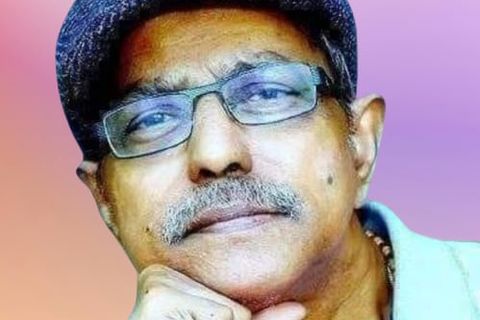THE STONE HUT - A SHORT STORY VY WILLIAMSJI MAVELI

Short Story
THE STONE HUT
-Williamsji Maveli
The life of a man named Lonayi was a quiet conversation between his hands and the earth. He lived on a green hill overlooking a valley, a place steeped in the whispers of forgotten history. At the heart of the dense forest at the top the hill stood a shrine built from hard stones and wood.
To the outside world, it was the "forest church," weathered by time. But for Lonayi, it was always the "Stone Hut"—a small, sacred space born from a deep spiritual yearning. He wasn't just a sculptor; he was the guardian of this place's soul.
Where others saw a decaying shrine, Lonayi saw the legacy of a yogi who had sought peace here centuries ago. He lived in the shadow of this holy site, dedicating every waking moment to his carvings. His tools were an extension of his soul, breathing life into the silent wood and cold stone. He didn't work for money but to give form to the history etched into the very landscape.
One afternoon, a smart young man from the village, and he climbed the steep difficult path to see Lonayi. –He was his only son named –Appu
He found him hunched over a large piece of stone, deeply engrossed in his work. Wood dust was caught in Lonayi's hair, and his clothes were caked with mud. The rhythmic 'tok-tok-tok' of his chisel echoed through the forest, a melody only the woods could understand.
Appu called out, his voice echoing. Lonayi didn't look up, but his hand stilled.
"Appu... why have you come?" His voice was as rough as the stones he worked on.
"My mother sent me," Appu said, keeping a respectful distance.
"She said you haven't been down to the village home in weeks. She's worried."
Lonayi finally sat up, rubbing his tired eyes.
"Worry is for those who have lost their way. I am here, where I am meant to be."
He pointed his chisel at a half-finished sculpture, the form of a meditating yogi.
"The voices of old times speak to me here."
Appu looked at the sculpture, his face a mix of confusion and awe.
"The villagers call you mad, Lonayi. They say this place has driven you crazy."
A faint smile touched Lonayi's lips.
"Madness is a perspective. For them, it is the noise of the city and the clamor of the crowd. For me, it is this solitude. They see a broken man; I see a man being made whole again."
Lonayi returned to his work, and the familiar 'tok-tok-tok' resumed. Understanding the conversation was over, Appu took out a small bag and placed the rice and vegetables on a nearby big rock stone.
"Come home soon," he whispered before heading back down the path.
Years ago, Lonayi was a different man. To build a better life for his family, he left his small village and traveled to the deserts of the Gulf. He worked hard, his hands grew calloused from labor, and his heart ached for home. But the promises of great wealth were a mirage, and the desert winds were so cruel, hence , he was fed up with Gulf based life style.
He returned after a decade, scarred by loneliness. His wife, Mariyam, was the first to witness his healing. One day, she found him in their yard, carving a piece of wood. It was a rough outline of a bird, but his eyes held a peace she hadn't seen in years.
"Lonayi," she asked softly, "what are you doing?"
He held up the bird.
"I don't know, Mariyam. My hands... they need to create something. For so long, they have only destroyed, working only for money."
Mariyam smiled, her eyes welling with tears.
"Then let them create, my love. Let them make something beautiful."
Lonayi’s passion for sculpting became his salvation. He moved his workshop to the hill, to the place they called the "forest church."
His children, Appu and Anitha, often visited him, bringing food and listening to the stories he told through his art.
"Appa,"
once asked, her small eyes wide with curiosity,
"Why do you always carve sad faces?"
Lonayi stopped carving and held up a small, sorrowful face.
"This isn't sadness, my daughter. It's longing. The longing of a man who waited for a moment he could never seize."
He looked at the face, remembering a time when he couldn't even feed his family.
"But look at this," he said, holding up a recent carving of a child with a laughing face.
"This is the sound of your laughter. This is what brings light to my darkness."
Lonayi's life was an evidence to his love for his family. While other men in the village worked in the cities, he chose his lonely path, and his family supported him unconditionally. They were his world, and his art was his tribute to them.
Lonayi's sculptures weren't just art or craft only ; they were pieces of a puzzles of wonders. He had found an old, decaying manuscript at the shrine, which chronicled a hidden treasure. The treasure was not gold or jewels but a precious book containing the yogi's spiritual wisdom.
To keep this secret safe, Lonayi hid clues about the treasure's location in each of his sculptures. This is why his carvings had an unusual appeal; each was a piece of a larger mystery. He was not greedy and had no desire to own the treasure. He saw it as a sacred trust, a heritage to be protected. His sculptures became his way of safeguarding the secret.
One day, two of Lonayi’s former apprentices, Vinu and Santhosh, came to visit him. They lacked Lonayi’s passion and dedication and were driven by a different kind of greed. They had noticed the unusual depth in Lonayi's creations and suspected there was a secret behind them.
"Lonayi-chettan," Vinu said, his eyes scanning the sculptures with a calculating look.
"These are magnificent. You must be making a lot of money."
Lonayi laughed.
"Wealth is in the eye of the beholder, my son. The joy I get from creating is my wealth."
Santhosh was more direct.
"We heard a story in the village that the yogi's treasure is hidden here. Is it true?"
Lonayi's eyes narrowed, a shadow of suspicion crossing his face.
"This place holds the treasure of peace. That is the only truth I know."
He turned away from them and resumed his work.
"Now, leave me to my work." Vinu and Santhosh looked at each other. They didn't believe him. Lonayi's response only confirmed their suspicions. They left, a malicious plan forming in their minds.
The monsoon season began, bringing with it heavy rains. The hill was covered in thick mist, and the sound of the forest gave way to the constant rhythm of the downpour.
Lonayi's stone and wood workshop became his world. He was working on his greatest creation, a large sculpture of a man rising from a pile of rocks. It was the final piece of the puzzle that would reveal the treasure's location.
One evening, as darkness fell, Vinu and Santhosh returned. Their feet sank into the muddy, rain-soaked ground. Lonayi was surprised to see them but invited them in.
"We just came to see how your work was coming along, Lonayi-chettan," Vinu said, a fake smile on his face. "And to get out of the rain."
Lonayi offered them tea, and they talked about their lives and plans. Lonayi felt a sense of unease, a feeling he couldn't shake.
As he turned to get some more wood, Santhosh took out a cloth soaked in a sedative and pressed it against Lonayi's face.
Lonayi's world began to spin, his consciousness faded, and his body grew weak. He fell, his chisel clattering to the floor.
"You fool," Vinu said angrily, his face contorted.
"Did you think we didn't know? We saw how you hid the clues. We will find it without your help."
Lonayi's vision blurred, but he could see them ransacking his workshop, smashing his sculptures as they searched for the clues. The sound of his life's work being destroyed stabbed his heart a thousand times. He tried to scream, but only a whimper escaped his lips. The rain pounded on the roof, masking the sounds of destruction and his silent agony.
A week later, when his family found the desolate workshop, the sight was unbearable.
Sculptures lay scattered in pieces, wood shattered, and stones cracked. There were bloodstains on the chisels and hammers, which terrified them. They immediately called the police.
Lonayi's son, Appu, stood amidst the broken sculptures like a stone, his heart turned to rock. He had spent his childhood here, learning from his father, and knew something the police didn't. He pointed to the remains of the shattered sculptures.
"Sir, my father wasn't just making sculptures,"
Appu explained to the officer.
"He was... telling a story. These sculptures were a map. He told me the secret of the forest church's treasure was in them."
The skeptical police officer looked at Appu with doubt.
" We have bigger things to look into than fairy tales."
"It's not a fairy tale!"
Appu insisted.
"My father was the guardian of this place. The real treasure isn't money; it's a book. He told me many times. The clues are in the art. This must be the work of people who came to steal it."
Convinced by Appu's sincerity, the police team, with the help of the family, began to piece together the broken sculptures like a jigsaw puzzle. Days turned into nights. Slowly, a pattern began to emerge. The fragments of wood and stone formed a rough map, pointing to the largest rock on the hill.
"There!" Appu shouted with hope.
"That's where he was working last. He was making his final sculpture there."
The police found Lonayi inside a small, hidden chamber within the large rock. He was weak and exhausted, his hands bleeding from wounds.
His captors, Vinu and Santhosh, had been trying to force him to reveal the secret, but he wouldn't give in. When they couldn't find the treasure themselves, they had abandoned him there.
Lonayi was admitted to the hospital. After his recovery, he insisted on returning to the forest church. He was determined to complete his final sculpture. That large carving became a symbol of his survival, a real evidence to his firm spirit.
As Lonayi worked, his family and the police watched in silence, the rhythmic 'tok-tok-tok' echoing through the forest once more. He worked with a new sense of purpose, his hands moving with a kind of divine grace. When the work was complete, he stepped back, a deep peace on his face. He walked to the base of the sculpture and gently tapped a stone. It moved, revealing a small, hidden chamber.
From within, he took out the fragile, ancient palm-leaf manuscript. The police officer's eyes widened.
"It's true," he murmured.
Lonayi looked at the manuscript, then at his family standing beside him.
"This," he said, holding it up, "is the story of this land. It is not something to be sold or hidden."
He then handed it to the police officer.
"It is for the people. For all of us."
Lonayi continued his work on the hill. The government recognized the forest church as a historical site and a place of spiritual importance. He became a legend, not for the treasure he found, but for the treasure he chose to protect.
He continued to carve, his hands telling the story of an artist who believed his art, history, and family were a greater treasure than all the wealth in the world.
END



